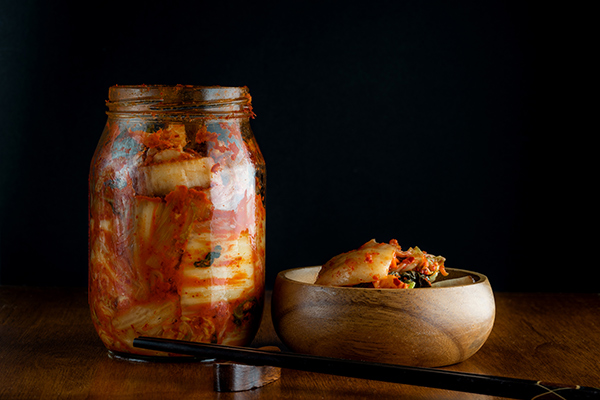Koreans have been enjoying salted and fermented vegetables known as kimchi for about 2000 years. It's typically served with steamed rice at every Korean meal. But this spicy dish is much more than a condiment
(Article republished from
GreenMedInfo.com)
Researchers in Korea published a comprehensive review of the health benefits of kimchi as a
probiotic. In it they cite 130 studies attesting to the amazing healing properties of this humble food.
Probiotics are the good bacteria populating the gut. The human gut contains over 400 strains of bacteria and the mix of different strains in each person is very individual.
Among other things, probiotics:
- promote a strong immune system;
- support healthy digestion;
- improve the amount of nutrients absorbed from food;
- help synthesize certain vitamins;
- protect against tooth decay;
- prevent diarrhea;
- reduce the risk of colon cancer and bladder cancer.
In addition,
probiotics in kimchi help the body detoxify from toxins like
bisphenol A, heavy metals, perclorate, and
organophosphorus pesticides.
The balance of good and bad bacteria in the gut can be disrupted by the use of
antibiotics. Gut bacteria is also disturbed by excessive alcohol use,
stress, diseases and toxins. All of these allow harmful bacteria to thrive. To rebalance the scales, good bacteria or probiotics are needed to repopulate the gut.
These good bacteria feature prominently in fermented foods like kimchi. Many bacteria strains are involved in the fermentation of kimchi but the most prominent is lactic acid bacteria. It's the source of many of kimchi's health benefits.
In addition, all of kimchi's traditional ingredients are health foods in their own right including cruciferous vegetables,
garlic,
ginger, and red pepper. Kimchi also contains high levels of vitamins (
vitamin C,
beta-carotene, and vitamin B complex), minerals (sodium, calcium, phosphorus, iron, and
potassium), and dietary fibers.
According to the new Korean study, research shows that kimchi has a long list of health actions including anticancer, anti-obesity, anti-diabetic, and anti-constipation. It promotes brain, skin, and colorectal health. It reduces cholesterol and blood clots, and has anti-oxidant and anti-aging properties.
Cancer. The Korean researchers developed a kimchi recipe to boost its anticancer effects. They added mustard leaf, Chinese pepper, and Korean
mistletoe extract. In lab tests on human colon cancer cells, the mistletoe extract increased inhibition rate from 62% to 80%.
[i] Animal studies show that kimchi also exhibits tumor suppression action. Researchers believe the anticancer effects of kimchi are mostly due to regulation of apoptosis of cancer cells and the inhibition of inflammation.
Obesity. Researchers tested the effects of kimchi on body weight in a group of obese women. Women who supplemented with capsules containing either 3 or 6 grams of freeze-dried kimchi every day achieved a remarkable decrease in body weight, visceral fat, and body mass index compared with the control group. Serum triglycerides were also significantly decreased in the kimchi-supplemented group compared with the control group.
[ii] Other studies show kimchi lowers fasting blood glucose, fasting insulin, blood pressure, and leptin levels.
[iii]
Lipid Profiles. In a study of 102 healthy Korean adult men aged 40 to 64 years researchers found eating up to 453 grams of kimchi a day was linked to higher good HDL cholesterol and lower levels of the so-called bad LDL cholesterol.
[iv]
Anti-Aging. Kimchi's anti-aging benefits come from its ability to decrease free radical production. Animal studies show kimchi increases epidermal thickness by up to 37% compared to a control group. It also increased
collagen production and free radical scavenging. Researchers attribute kimchi's anti-oxidant activity to high levels of chlorophyll, vitamin C,
carotenoids, and phenolics.
Lactic acid bacteria from kimchi have been shown to have the following probiotic properties
[v], [vi]:
- survive the transport in the human GI tract and to colonize the large intestine,
- survive in the stressful environment of the stomach characterized by acidic pH and bile,
- exert antioxidant activities,
- produce antimicrobial substances,
- possess protective effect against cancer development,
- enhance the immune system of the host,
- decrease inflammatory or allergic reactions,
- lower cholesterol, and
- prevent diarrhea and constipation.
Thousands of years ago, the major ingredient in kimchi may have been radish. Today's version uses Chinese cabbage developed in the 18
th century.
The Korean researchers estimate there are more than 167 different types of kimchi. The taste varies with its ingredients, fermentation conditions, and lactic acid bacteria involved in the fermentation. Other ingredients popular in kimchi mixtures include
watercress, mustard,
pear,
apple,
pine nuts, chestnut, gingko nut, cereals,
fishes, crabs, cucumber, green onion, and leeks.
The most popular version in Korea is made by lacto-fermentation of
cabbage, radish, green onion, red pepper powder, garlic, ginger, and fermented seafoods (jeotgal).
Read more at:
GreenMedInfo.com
 Parler
Parler Gab
Gab










